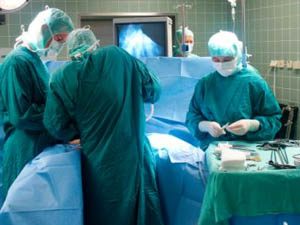Gastric Band Surgeries
With obesity becoming an epidemic in the western world it is becoming increasingly common for people to opt for a form of weight loss surgery. A laparoscopic gastric band is the most popular type of weight loss surgery in the UK. It is available both privately and on the NHS.
Operation
A gastric band operation is intended to help very obese people to lose weight. It works by decreasing the size of the stomach, meaning that patients will feel fuller quicker and for longer. In the UK, patients are generally only recommended for surgery if they have tried and been unsuccessful with conventional weight loss methods such as diet and exercise first. Surgery is seen as a last resort. The operation will also only be offered to patients with a body mass index of over 40 or over 35 with weight related health problems such as diabetes.
When a patient has been referred for gastric band surgery they will meet with the surgeon who will ensure they understand the benefits and also the risks of the surgery. The patient will be asked to prepare for the surgery, which will include stopping smoking, and fasting for a certain amount of time before the operation.
The actual operation usually takes around one hour, and is performed under general anaesthetic. Most operations will be performed with the laparoscopic (keyhole) procedure as it is safer and it takes the patient less time to recover than with open surgery. During laparoscopic surgery, small incisions are made in the abdomen. The surgeon will then use several small instruments, guided by a surgical camera to place the band around the top part of the patient’s stomach. The band is then connected to an injection port (for filling the band at a later date) and placed under the skin. The band is then locked into place.
After surgery
After surgery the patient will need to rest whilst the anaesthetic wears off, then they are encouraged to walk around to prevent the chance of blood clots. Patients usually require a one night stay in hospital and can go home the day after their surgery. The surgeon will advise on a diet to follow over the following four weeks. The first two weeks after surgery the patient should only drink liquids, the following two weeks only pureed and very soft food is allowed, and after four weeks the patient can eat any texture of food. The surgeon will see the patient at follow up appointments to add saline solution into the band to help with the weight loss. The patient is also expected to change their lifestyle after surgery, which includes exercise and a healthy diet.
Risks
As with any type of surgery, there are risks involved. Of all the weight loss surgeries, gastric band surgery is deemed the safest with a mortality rate of 1 in 2000. The risks are dependent on the individual and these will be discussed with the patient before the operation. Not everyone loses weight with gastric band surgery, and some people even gain weight. If this happens a doctor will discuss with the patient the option of gastric bypass surgery.

